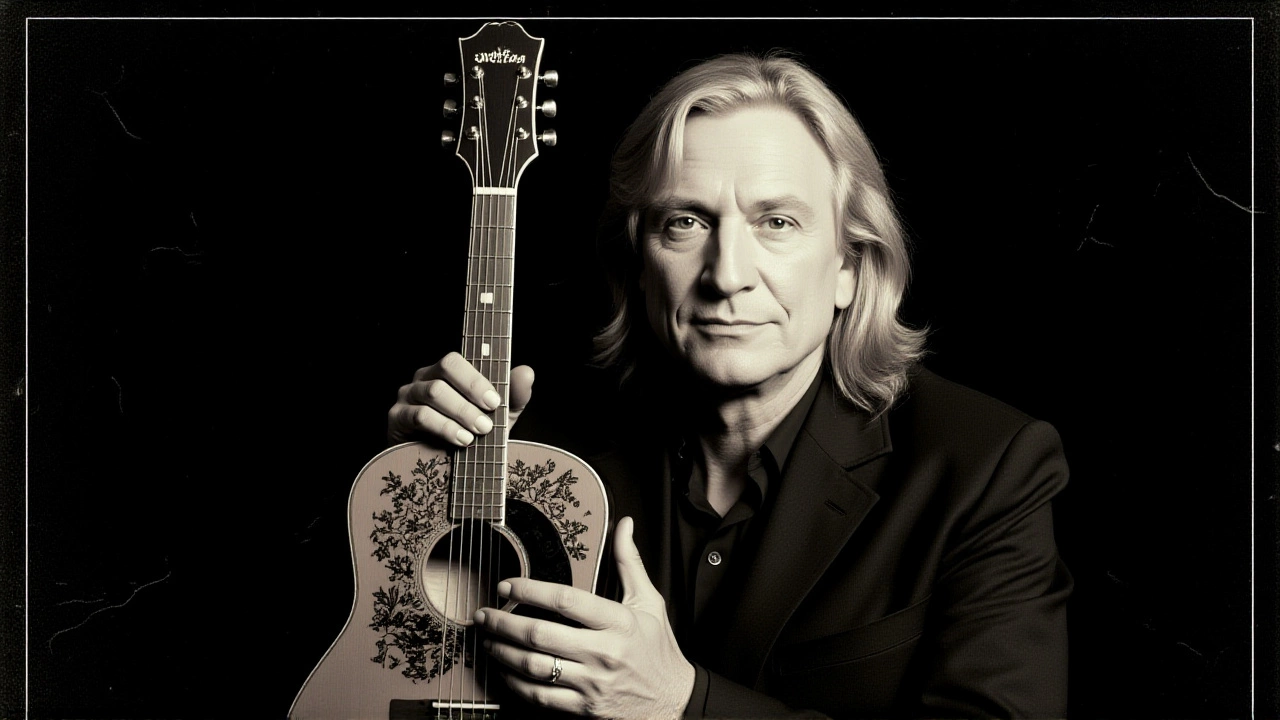It started with a lawnmower, a neighbor’s rose bushes, and a melody that changed everything. Joe Walsh, the Rock and Roll Hall of Fame guitarist best known for his work with The Eagles, admits that his 1973 solo hit Rocky Mountain Way didn’t just launch his career — it saved his life. The song emerged not in a studio, but while he was cutting grass in Colorado, just weeks after walking away from the James Gang. He was broke, broken, and unsure if he’d ever make music again. Then, the lyrics came: “Spent the last year Rocky Mountain way / Couldn’t get much higher.” He didn’t stop to turn off the mower. By the time he realized what he’d done, the machine had carved a path through Mrs. Henderson’s prize-winning roses. The damage? $1,500. "You don’t understand," he told her. "I got the words." She just looked at him. "Well," Walsh says now, "it was worth it."
The Song That Pulled Him From the Edge
Walsh had spent years as a rising star in the James Gang, but by 1972, he was drowning in self-doubt and creative stagnation. Moving to Colorado was less a fresh start and more a desperate escape. He wasn’t sure he could write another song. He wasn’t sure he wanted to. But Rocky Mountain Way — with its swaggering riff, gritty vocals, and unapologetic freedom — became his anthem of release. "I got kind of fed up with feeling sorry for myself," he told Guitar Player. "I wanted to justify and feel good about leaving, relocating, going for it on a survival basis." The song wasn’t just a hit — it was a lifeline. It reached #23 on the Billboard Hot 100, and for the first time, Walsh felt like he was truly his own man.TikTok’s Unexpected Second Act
Fast forward 52 years. A new generation of music lovers, scrolling through TikTok, stumbled upon the song’s opening riff. They began posting videos with the caption: “Unfortunately, I do love…” followed by a list of their messy, beautiful, chaotic habits — midnight snacks, binge-watching reality TV, buying too many guitars. Rocky Mountain Way became the soundtrack. By November 2025, the song had re-entered the Billboard Digital Songs chart, climbed into the top 50 on Spotify’s Global Viral chart, and was being used in over 800,000 TikTok clips. "I didn’t know kids still listened to anything older than 2020," Walsh joked in a recent interview. "Now I’m the TikTok phenomenon. Who knew?"
A Life Marked by Loss and Redemption
Walsh’s journey hasn’t been smooth. He’s been open about his battles with addiction, a struggle that nearly cost him everything. He credits a man named Smokey — a friend, a mentor, a guardian angel — for pulling him out of the darkest places. "I don’t know what I would have done without Smokey," Walsh said last year. "Now that silence has returned, only this time it’s permanent." That silence? Smokey’s death. Walsh now walks with grief, but he walks with purpose. As a Gold Star son — his father died serving in the military — Walsh founded VetsAid in 2017. The nonprofit, a 501(c)(3), has disbursed over $4 million to veterans’ organizations across the U.S., funding mental health programs, housing initiatives, and job training. "These guys came home and no one was waiting," Walsh says. "I was lucky. They deserve better."Auction, Concert, and Legacy
This November, Walsh returns to his birthplace — Wichita, Kansas — for the 2025 VetsAid benefit concertWichita, Kansas. The lineup reads like a who’s who of American roots rock: Vince Gill, Nathaniel Rateliff, Susan Tedeschi & Derek Trucks, and Ryan Bingham. Tickets sold out in 72 hours. Then comes the auction. Julien’s Auctions will host Life’s Been Good: Joe Walsh at the Troubadour in West Hollywood, California on December 16–17, 2025. Over 800 items will be up for bid: guitars, stage-worn jackets, handwritten lyrics, even the lawnmower he used the day he wrote Rocky Mountain Way (it’s been restored). "One thing you find about human nature," Walsh says with a grin, "is we collect things. And I’ve acquired too much stuff. So I’m giving people a chance to own a piece of my mess — and help vets in the process. And now I’ll have more room in my warehouse to go get more stuff!"
Why This Matters
This isn’t just nostalgia. It’s proof that art can be both deeply personal and universally healing. Rocky Mountain Way began as a cry for freedom in a Colorado backyard. Now, it’s helping young people confess their flaws, and helping veterans find their footing. Walsh’s story isn’t about fame. It’s about survival. About finding your voice when you’re broken. About turning damage into purpose. He doesn’t see himself as a hero. Just a guy who kept going. "I didn’t choose the music," he says. "It chose me. And I’m still listening."Frequently Asked Questions
How did 'Rocky Mountain Way' help Joe Walsh recover from his struggles?
The song marked a turning point after Walsh left the James Gang, helping him reclaim his identity as an artist rather than a band member. Writing it during a moment of personal crisis gave him emotional catharsis, and its commercial success validated his decision to go solo — a crucial step in rebuilding his self-worth amid addiction and depression.
What role does TikTok play in reviving classic rock songs like 'Rocky Mountain Way'?
TikTok’s algorithm favors emotionally resonant, instantly recognizable hooks — and Rocky Mountain Way’s opening riff fits perfectly. The platform’s trend format, where users pair music with personal confessions, turned the song into a vehicle for vulnerability, making it relatable to Gen Z listeners who may have never heard it before.
How has VetsAid impacted veterans’ services since its founding in 2017?
VetsAid has distributed over $4 million to more than 120 regional and national organizations supporting veterans, including mental health counseling, housing assistance, and job training. Programs funded by VetsAid have served over 40,000 veterans across 37 states, with particular focus on those struggling with PTSD and homelessness.
Why is Joe Walsh auctioning his personal items, and how will the proceeds be used?
The Julien’s Auctions event, titled Life’s Been Good: Joe Walsh, will sell over 800 personal artifacts, including guitars, stage outfits, and memorabilia. A portion of the proceeds — estimated at 20–30% — will directly fund VetsAid’s programs, continuing Walsh’s commitment to supporting veterans through his legacy rather than just his income.
Who is Smokey, and why does Joe Walsh credit him with saving his life?
Smokey was a close friend and recovery mentor who helped Walsh navigate addiction during the 1980s and ’90s. Walsh has described him as the only person who never gave up on him, even during his lowest points. Smokey’s death in 2024 left Walsh grieving deeply, but also more determined than ever to honor his memory through his work with veterans and music.
Is there any connection between Joe Walsh’s military background and his charity work?
Yes. Walsh is a Gold Star son — his father died in military service — and he’s spoken openly about growing up with the weight of that loss. He says he felt a responsibility to give back to those who served, especially since many veterans face isolation and mental health struggles similar to what he endured. VetsAid is his way of turning personal grief into collective healing.


